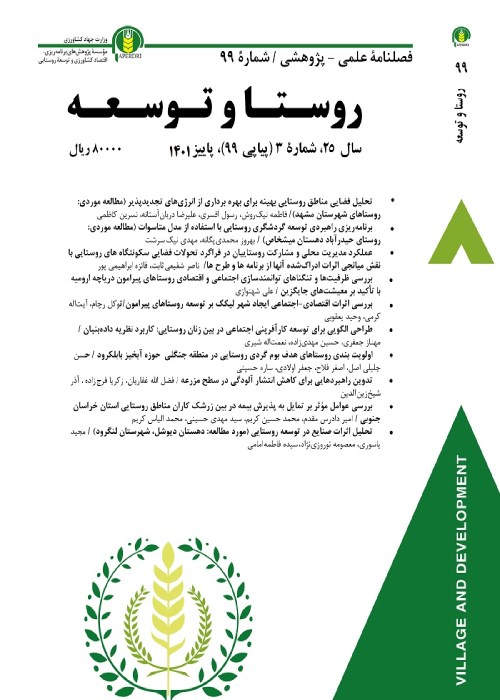Investigating the Components Affecting Food Security of Rural Households in the Provinces of IranFraction Probit Panel Approach
Food security is the most important principle for maintaining the health of society, when affecting various dimensions such as political, economic, social and cultural dimensions. Therefore, it is very important to examine the food security situation and identify the factors affecting it, so that practical policy and support solutions can be provided to improve the nutritional status of the society.
In this study, in order to investigate the factors affecting food security in the provinces of the country, the fractional Probit panel model, which is bounded for the dependent variables, has been used. The boundedness of the dependent variable (the food security index is in the range (1 and 0)), differentiates this model from the common panel data method. The difference of these variables from the point of view of econometrics is that not only do they have a possible outcome, but they include both the outcome of the corner solution and the continuous outcome in the range of zero and one.
According to the obtained results, using the fractional Probit panel approach, the variables of Gini coefficient, per capita tax, unemployment and inflation, have a negative and significant sign, and the variables of per capita income and financial development index have a positive and significant sign. Considering the final effect of the Gini coefficient on food security, it is expected that with an increase of one percent in the Gini coefficient, the food security index will decrease by 0.07 percent. Per capita tax, with a final effect of -0.99, shows that with a one percent decrease in this variable, the food security situation increases by 0.99 percent. Considering the positive and significant effect of financial development on food security, with a one percent increase, the food security index will improve by 0.13 percent. With a one percent increase in per capita income, the food security index increases by 0.84 percent. The sign of the inflation variable in this model is negative and it indicates the decrease in food security due to the increase in inflation. In fact, inflation reduces the availability of food by reducing purchasing power and as a result reduces the level of food security, so according to the results, with a one percent increase in inflation, the food security index will decrease by 0.17 percent. In fact, this result can be expressed as considering that the increase in the general level of prices reduces the available income and purchasing power of households, which reduces the economic access to food and food with higher nutritional value and threatens food security. The effect of the unemployment rate variable on food security is negative, which means that with a one percent decrease in the unemployment rate, the food security index will improve by 0.06 percent.
Based on the results, considering the final negative effect of the Gini coefficient on food security, it is suggested that the structure of income distribution by the government through implementing targeted and principled policies in line with investment in the provision of facilities and public goods and infrastructure, especially in less developed areas and rural areas should be reviewed and redesigned. The implementation of this policy by increasing the amount of per capita income and more public facilities, in addition to the distribution of income will become more balanced and help to reduce inequalities. Considering the negative effect of per capita tax on food security, it can be said that the effect of indirect tax on food security was greater than the effect of direct tax. In other words, due to the negative impact of indirect taxes on income distribution and its high share in the country's tax revenues, its destructive effect on income distribution has been overcome, and therefore, with the increase of the Gini coefficient and the decrease of available income, the food security situation worsens. Considering the positive and significant effect of financial development on food security, by creating a healthy competitive environment in the banking system and making payment facilities efficient, facilities and credits granted to the economic and production sectors are directed and on the other hand, by using new methods in the financial and capital markets, it will be possible to increase the access of individuals, companies and enterprises to financial tools and facilities in order to improve the performance and level of national production to help improving food security. Also, the results showed that inflation has a negative effect on food security. Inflation, especially high and continuous in Iran's economy, causes uncertainty in investment, lower real interest rates, and more depreciation of capital, which, along with the outflow of capital from the country, in the long term, causes a decrease in food security by reducing the purchasing power of the household. On the other hand, unemployment causes poverty by decreasing the household income, followed by a decrease in food security, which due to the two-way relationship between poverty and the destruction of natural resources leads to problems like soil erosion, water pollution, emission of greenhouse gases and the loss of environmental diversity, which limit production and production resources in the long term, leading to the food security situation to be more endangered.
- حق عضویت دریافتی صرف حمایت از نشریات عضو و نگهداری، تکمیل و توسعه مگیران میشود.
- پرداخت حق اشتراک و دانلود مقالات اجازه بازنشر آن در سایر رسانههای چاپی و دیجیتال را به کاربر نمیدهد.



